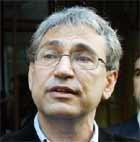Court Decides: Armenian Conference Should Have Been Held
By Anadolu News Agency (aa)
Published: Friday, October 14, 2005
zaman.com
The judiciary has reached a verdict on the controversial Armenian Conference held at Bilgi University on September 25.
Istanbul Regional Administrative Court has reversed the suspension of execution decision reached previously by the Istanbul 4th Administrative Court concerning the “Ottoman Armenians during the Decline of the Empire: Issues of Scientific Responsibility and Democracy Conference”. Objections from Bogazici and Sabanci Universities submitted to Istanbul 4th Administrative Court concerning its suspension of execution decision were turned down by the Istanbul Regional Administrative Court and the parties were notified on 29 September 2005. The Regional Court read, “Demands for suspension of execution were rejected unanimously without being examined.”
Istanbul
By Anadolu News Agency (aa)
Published: Friday, October 14, 2005
zaman.com
The judiciary has reached a verdict on the controversial Armenian Conference held at Bilgi University on September 25.
Istanbul Regional Administrative Court has reversed the suspension of execution decision reached previously by the Istanbul 4th Administrative Court concerning the “Ottoman Armenians during the Decline of the Empire: Issues of Scientific Responsibility and Democracy Conference”. Objections from Bogazici and Sabanci Universities submitted to Istanbul 4th Administrative Court concerning its suspension of execution decision were turned down by the Istanbul Regional Administrative Court and the parties were notified on 29 September 2005. The Regional Court read, “Demands for suspension of execution were rejected unanimously without being examined.”
Istanbul





Comment